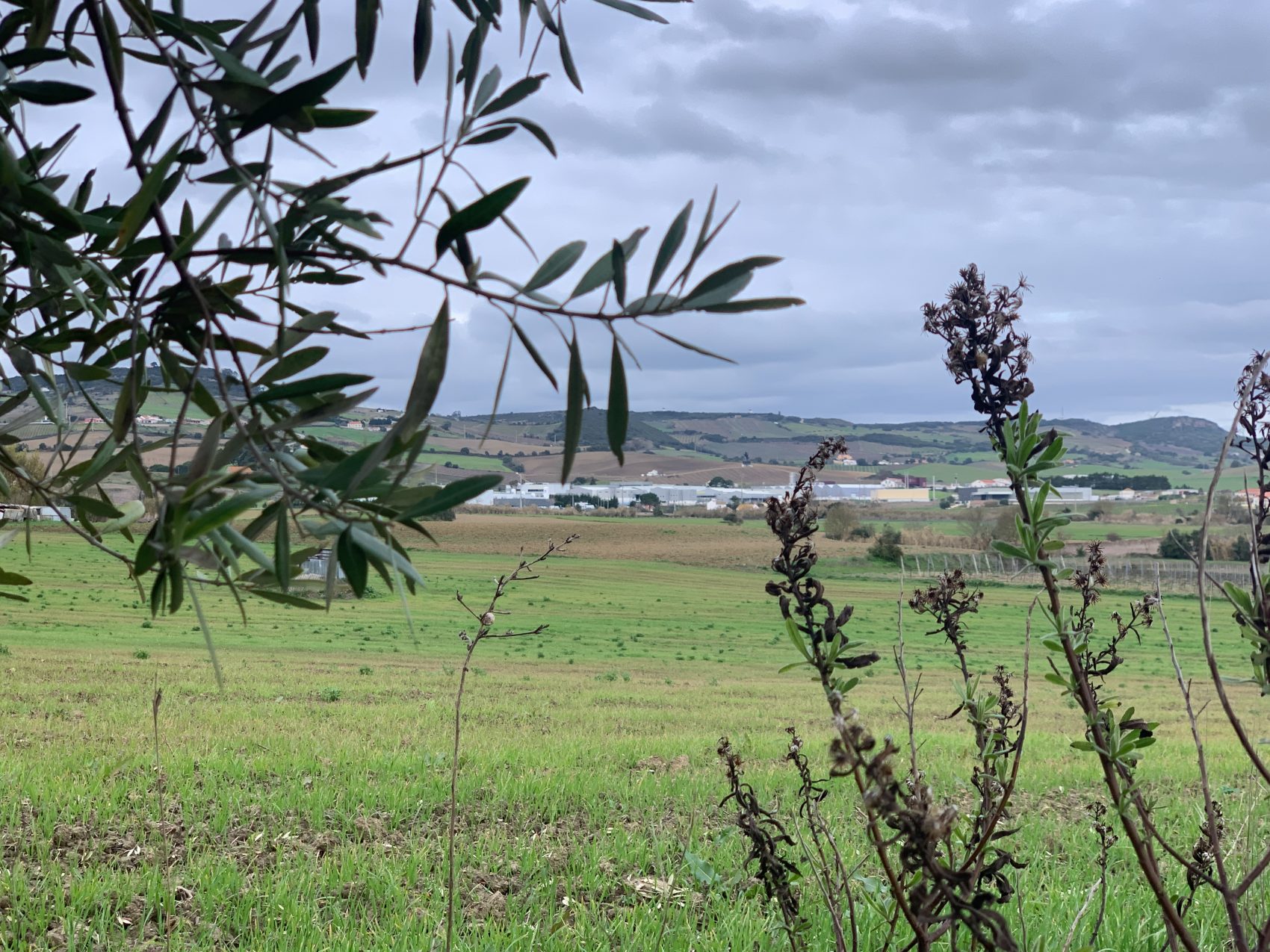Os dias do fim da terra
Chamam-lhe o Vale Encantado. Rodeado por montes que o abraçam, o vale de Arruda dos Vinhos viu nascer escritores e poetas, agigantando-se, entre eles, o vulto da poetisa Irene Lisboa (1892-1958). Local de lendas sobre princesas mouras que guardam tesouros, lobisomens e bruxas, a paisagem rural de Arruda tem inspirado mentes criativas ao longo de gerações, e a vila tem sabido preservar legados históricos e a sua identidade rural muito centrada na produção vinícola, na produção cerealífera e em culturas como a oliveira e pomares de frutas. Suficientemente perto de Lisboa, onde trabalham muitos dos seus habitantes, está paradoxalmente longe para, até agora, ter escapado à pressão urbana e à descaracterização identitária. Os seus solos férteis são a maior benção desta terra milenar.
Dita o poder local que é necessária a construção de uma rodovia que desvie do centro da vila de Arruda o trânsito vindo do pequeno parque industrial das Corredoras, a pretexto de haver melhor qualidade do ar na povoação. Inicialmente, estava previsto um traçado que tentava o menor impacto sobre terrenos, mas, recentemente, o Plano Diretor Municipal foi suspenso, e foi desenhado um novo traçado. Este impacta terrenos da Reserva Agrícola Nacional e da Reserva Ecológica Nacional, os quais serão irremediavelmente destruídos com a construção de piso de asfalto. Os solos à volta também serão depreciados, e o custo de perda agrícola e ecológica não tem preço.
Peço, nos serviços da Câmara Municipal, que me facultem o Estudo de Impacto Ambiental. Não foi feito, pois, informam-me, há todo um emaranhado legal que pode escusar esse estudo nesta situação. Peço, então, os pareceres da Comissão de Coordenação e Desenvolvimento Regional e da Agência Portuguesa do Ambiente, os quais não estão divulgados para consulta pública. Pedidos não respondidos até agora, apesar das insistências feitas presencialmente.
Esta imagem de solos dormentes pelo inverno, respirando a calma do pousio e a erva que cresce com as águas da estação, vai deixar de existir. Numa extensão de 2,25 km, a destruição será inclemente. As expropriações estão a ser feitas em surdina, oferecendo-se por parcelas de chão agrícola menos de um euro por metro quadrado. A terra que deveria ser inviolável está, sem saber, apta para o estupro. Olho para este desastre prestes a acontecer e penso o que nos perguntarão as gerações futuras sobre a delapidação que operámos num planeta onde começam a rarear solos desta tipologia. Portugal tem das leis mais amigas do ambiente. No entanto, tal é no papel. Grandes obras públicas, como a construção do novo aeroporto de Lisboa, ou pequenas, como esta, atravessam-se à frente das leis, e o ambiente deixa de ser prioritário. Sim, estes são os dias do fim da terra…
Das Aus für die Erde
Es wird Vale Encantado, das Verwunschene Tal, genannt. Zwei Hügelketten umschließen das Tal von Arruda dos Vinhos, wo Schriftsteller und Dichter das Licht der Welt erblickten, darunter so bedeutende Figuren wie Irene Lisboa (1892-1958). Die Gegend ist Schauplatz zahlreicher Legenden von maurischen Prinzessinnen, die Schätze hüten, von Wolfsmenschen und Hexen. Über Generationen hinweg hat die Landschaft von Arruda viele schöpferische Geister inspiriert und der Ort hat sein historisches Erbe und seine ländliche Identität zu bewahren vermocht, deren Mittelpunkt der Wein- und Getreideanbau, die Oliven- und Obstbaumhaine bilden. Nah genug an Lissabon, wo viele der Einwohner arbeiten, liegt es doch abgelegen genug um von dem Druck durch Verstädterung und Identitätsverlust verschont zu bleiben. Die fruchtbaren Böden sind der größte Segen dieses uralten Landstriches.
Doch die lokale Regierung befindet den Bau einer Umgehungsstraße für notwendig um den Verkehr aus dem kleinen Gewerbegebiet Corredoras vom Ortskern Arrudas fernzuhalten. Angeblich um für die Bevölkerung die Luftqualität zu verbessern. Ursprünglich war eine Straßenführung geplant, die den Landschaftsverbrauch so gering wie möglich hielt, jedoch wurde dieser Plan kürzlich aufgehoben und die Straßenführung neu geplant. Durch die Neuplanung sind nun nationale Natur- und Landwirtschaftsschutzgebiete betroffen, die durch den Straßenbau unwiederbringlich zerstört werden. Die angrenzenden Felder verlieren an Wert und der Verlust für Landwirtschaft und Umwelt ist gar nicht zu beziffern.
Ich bitte den Gemeinderat um Einsicht in die Umweltverträglichkeitsstudie. Eine solche wurde nicht erstellt, teilt man mir mit, denn es gäbe einen ganzen Wust an rechtlichen Bestimmungen, der in solch einem Falle so eine Studie unnötig macht. Also bitte ich um die Gutachten der Regionalen Entwicklungskommission und der Portugiesischen Umweltbehörde, die nicht öffentlich zugänglich sind. Ein Anliegen auf das ich bis jetzt keine Antwort erhalten habe, ungeachtet dessen, dass ich persönlich dort erschien um dem Nachdruck zu verleihen.
Das Bild von Feldern im Winterschlaf, die brachliegend ruhen und auf denen in der feuchten Jahreszeit wildes Grün sprießt, wird verschwinden. Über eine Strecke von 2,25 km wird es gnadenlos zerstört. Die Enteignungen finden im Stillen statt, geboten wird für landwirtschaftlich nutzbaren Boden weniger als ein Euro pro Quadratmeter. Die Erde, die unverletzlich sein sollte, darf vergewaltigt werden. Ich schaue auf die bevorstehende Katastrophe und stelle mir vor, wie kommende Generationen uns ausfragen über die Vergeudung, die wir mit diesem Planeten betreiben, auf dem solche Flecken immer weniger werden. Portugals Gesetze zählen zwar zu den umweltfreundlichsten, jedoch nur auf dem Papier. Bei großen öffentlichen Bauvorhaben wie Lissabons neuem Flughafen oder bei kleinen wie diesem, kollidieren die Interessen und die Umwelt zieht den Kürzeren. Das bedeutet das Aus für die Erde…
Übersetzung: Lea Hübner
The Days Earth Meets its Fateful End
They call it “The Enchanted Valley.” Surrounded by embracing hills, Arruda dos Vinhos is a valley that gave us writers and poets―the most prominent among them being poet Irene Lisboa (1892-1958). It is a place of legends, with stories about Moor princesses with hidden treasures, as well as werewolves and witches. The natural Arruda landscape has inspired creative minds through generations, and the village has been able to preserve its historical legacy and rural identity, which is heavily focused on winemaking, grain production, olive growing, and fruit orchards. It is close enough to Lisbon, where most of its inhabitants commute to work, but it has remained paradoxically far away, enough to escape urban pressures and loss of identity. Its fertile soil is the biggest blessing this ancient land could have ever asked for.
According to local authorities, there is a need to build a freeway to steer away from downtown Arruda all the traffic generated by the small industrial park located in Corredoras. They say it is an effort to improve air quality in the area. The original freeway was designed to impact the land as little as possible. However, the Municipal Master Plan was put on hold and a new design has been proposed. The new design impacts the lands owned by the National Agricultural Reservation and the National Ecological Reservation, which will be irreparably destroyed once asphalt is laid on the ground. The surrounding land will also be deprecated, and agricultural and ecological losses will be inestimable.
I pleaded with the City Council to order an Environmental Impact Study. I was told such study had not been performed due to bureaucratic mechanisms, which justified forgoing it altogether in this case. I then requested a copy of expert reports issued by the Commission for Regional Coordination and Development and the Portuguese Environmental Agency, but none of these reports have been released for public viewing. My request hasn’t been addressed so far, despite my going there personally to insist on the subject.
The area pictured here―showing the dormant soil that breathes in tranquility during the fallow period, as well as the tall weeds that have grown due to the recent rainy season―will soon no longer exist. There will be merciless destruction along 2.25 km. The dispossession strategy is being carried out on the downlow, and less than one euro has been offered per square meter of farmland. Our sacrosanct land is unknowingly being prepared to be raped. As I witness the disaster that is about to happen, I wonder what future generations will ask us about the dilapidation of a planet where fertile soil like this has become so rare to find. Portugal has some of the most environmentally friendly legislation in the world. Still, it is in paper only. Large infrastructure projects, such as the construction of the new Lisbon airport, as well as smaller-scale public works like this one are running over our laws, and the environment no longer is seen as a priority. Yes, these are the days when Earth starts to meet its fateful end…
Translation: Rafa Lombardino
Teilen












